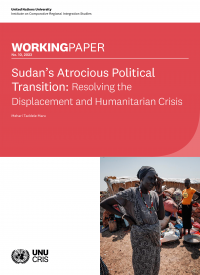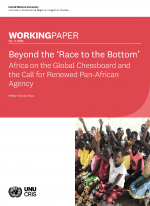Sudan’s Atrocious Political Transition: Resolving the Displacement and Humanitarian Crisis

This paper examines the increasing displacement and intensifying humanitarian crisis in the Republic of Sudan, resulting from the war between rival factions of the armed forces, namely the Sudanese Armed Forces (SAF) and the Rapid Support Forces (RSF). It highlights how poorly governed political transitions and centre–periphery rivalries contribute to ongoing war, death, destruction, and displacement. The data shows rapid changes in patterns of human displacement within Sudan and beyond its borders, with Khartoum and the Darfur region now being the primary origins and hosts of displacement respectively. Currently, half of Sudan’s population requires aid, owing to the dire humanitarian consequences of the war.
The paper advances a dual approach – addressing urgent humanitarian needs and cessation of hostilities while pursuing long-term solutions through inclusive political transition and governance reforms to resolve protracted displacement. It argues that addressing the complex dynamics of Sudan’s enduring conflicts and achieving sustainable peace require more than just immediate actions such as a ceasefire and unhindered humanitarian access. What is also needed is a comprehensive approach to tackling the political roots of these conflicts. While acknowledging the priority of a ceasefire and humanitarian access, the paper delves into the political dimensions of the conflict, and the necessity of a civilian-led transition process that is both inclusive and comprehensive, encompassing various Sudanese stakeholders. It emphasises the need for inclusive, civilian-led negotiations that go beyond the military leadership and critically examines the evolving roles of armed groups, Islamists, and former National Congress Party members, highlighting the importance of adapting negotiation strategies to new realities on the ground.
A successful resolution to the conflict requires a comprehensive political transformation and a commitment to addressing underlying issues. In addition, the paper addresses the effect of external interventions on Sudan’s internal affairs particularly from the states in the Middle East and neighbourhood. It advances a transition strategy that tames external interferences, while at the same time promoting decentralized governance. This approach help dismantle the centralised power structures that have relied in the support of external actors and historically fuelled protracted war, thereby paving the way for a more decentralised, stable and accountable transitional process. Enabling a transition inclusive of all civilian stakeholders in the transition process is crucial for insulating a Sudanese peace process that could deliver a sustainable ceasefire, effectively resolving the Sudan’s prolonged conflicts, halting the atrocities in Darfur and elsewhere, and addressing mass displacement within and outside Sudan.

